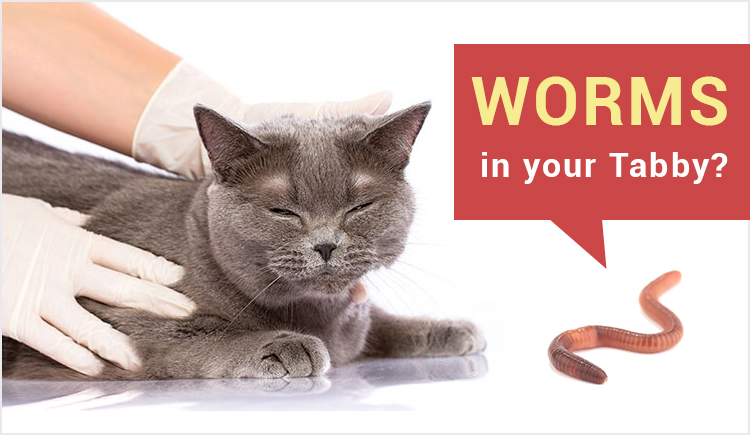The great Australian backyard has been the hunting ground of its prey for Australian cats since a very long time. But with time another hunter has developed that is hunting down the felines. This new hunter is the parasitic worm. Your tabby can get parasitic worms when they eat infected animals like rats, mice, snails and even insects. Hence, it is very important for you as a cat owner to be on the guard always and keep the environment around your tabby clean.
It has usually been found that feral cats always have worms and if your feline comes in contact with them they can also get the worms. But if your cat does not move outside, then there is very little chance of them getting worms, but if they chase mice and rats in the house, they can get worms.
How worms affect the lives of your cat?
Worms reside in the intestine of your cat and feed either on the intestinal wall’s blood supply or on undigested food. The worms lay eggs which are passed in the form of feces where they get contracted by other felines or reinfested by the original cat. There are different species of worm larvae that gets passed through the queen’s milk to the newborn kittens which results in undernourishment in newborns.
The problem is that new born kittens cannot be treated immediately for worms and so it is important that breeding cats need to be kept away from worms before they get pregnant. Kittens can only be given worming treatment once they are at least three weeks of age.
Treatment of Worms in Cats
It is very important to provide regular deworming to your cat. This means that an adult cat needs to be dewormed every three months. Please note that although the worms that are present in the cat’s intestine gets killed with the deworming treatment, recurrence of worms from other pets and the environment can happen and so one time treatment is not enough.
Young kittens need to be dewormed at 6,8, and 12 weeks and after that period on a three-monthly basis. If you have pregnant and lactating queens that they should be given deworming treatment before mating, ten days prior to kittening and two to four weeks after kittening.
Your veterinarian will suggest an effective deworming treatment like pastes or tablets encompassing Milbemax Allwormer Tablets, Drontal Allwormer, Felex Plus Allwormer Paste, Popantel for Cats, and Virbac Tapewormer for Cats. There are also certain spot-on products available in the market for treating roundworms and hookworms on a monthly basis along with fleas and heartworm like Profender Allwormer.
Different Types of Worms that Affect Cats
Heartworms
Mosquitoes carry heartworms that infect hosts after first biting an already infected host. Some of the symptoms when heartworms bite cats include: vomiting, coughing, and asthma. There are certain cats that do not show any symptoms till the heartworm leads to serious condition. But it has generally been found that these worms affect dogs more than the cats.
It takes a heartworm six months to grow from the larvae stage to adult worm. It can reside inside the cat for many years to come. Hence, if your infected cat gets reinfected in the following mosquito season then it results in a more serious predicament as the new worms reach adulthood while the older worms are still present in the cat.
Hence, it is better to take preventative treatment when the larvae of the heartworm can get eliminated before it gets transformed into an adult. Take the advice of your veterinarian and he/she would suggest preventative treatments like Milbemax Allwormer for Cats to prevent this disease in cats.
Roundworms
Cats get infected with roundworms when they ingest eggs from the environment or eat infected mice, birds and beetles. New born kittens can get infected through the queen’s milk straight away after birth. The adult worms can be seen in the intestine of the cat. They are of maximum 10 cm in length and can lead to obstruction and reduced desire for food. Kittens when infected by roundworms have a “pot belly” appearance, show failure to grow and sometimes death in extreme cases.
Hookworms
These types of worms are quite common in Australia. They stick to the intestinal wall of the cat and suck blood leading to weakness, anaemia, bloody diarrhea and even death of young kittens. They can even lead to weight loss and weakness in them.
Whipworms and Threadworms
These types of worms are tiny in size and they cause less problems in felines as compared to other types of worms. But when your cat gets infected by these worms they lose condition, weight, fur quality and also suffer from diarrhea.
Tapeworms
These types of worms are spread through fleas and lice. The tapeworm’s life cycle development in fleas and when a cat ingests an infected flea, the tapeworm gets into the intestine of the feline. It can be about 50 cm in length. But normally it has been found that single segments consisting of eggs are seen in the feces of cats or around the tail and anus just like rice grains that causes itchiness and continuous licking. But the infection caused by these worms is not serious until infestation is recognized.
Steps to Avoid Worm Infestations in Cats
- A yard is a great place for your feline to enjoy, but that is also the place where they can get worms. Hence, it is better to keep the feline inside since an indoor cat is less likely to get worms than an outdoor cat.
- Clean their bedding and feed bowls on a regular basis
- Controls fleas in the environment by using flea preventative treatment
- Deworm other pets in the household
- Get rid of cat droppings from the yard and litter trays
- It is very important to keep the litter box of the feline clean. Keep your indoor pet strictly away from rodents and strays


